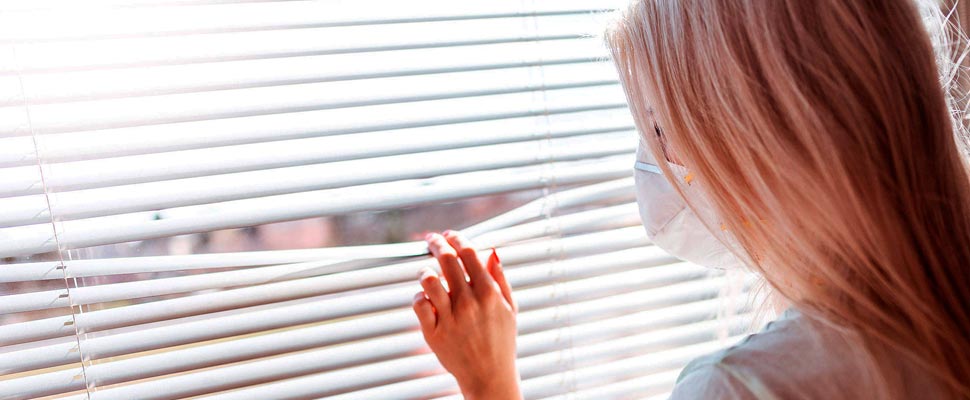4 tips for mental wellbeing during the coronavirus lockdown
With all the changes happening as we overcome this pandemic, it’s easy for us to feel overwhelmed, anxious, and stressed.

These tips can help you maintain mental health during the lockdown season. / Photo: Picjumbo
LatinamericanPost| Carolina Rodríguez Monclou
Listen to this article
Leer en español: 4 consejos para el bienestar mental durante el bloqueo del coronavirus
During an interview with the Turkish news channel TRT World, the psychiatrist's Daniel Spitzer and Tayyab Rashid with the psychotherapist David Marsten gave professional recommendations to overcome the psychological symptoms caused by coronavirus lockdown.
Due to the COVID19 pandemic, anxiety, and stress have increased. People are feeling a greater sense of low mood and depression. Even if staying home is the best way to stay protected from the virus, it isn't easy.
"During a pandemic crisis like this for many different reasons, it's normal for us to feel sad, insecure, worried, anxious, and angry," claims the Psychiatrist Daniel Spitzer, a Neurosurgery Specialist who graduated from New York U, with over 37 years of experience.
Social isolation can make it even worse, especially if you think that it may take longer. According to Spitzer, indeed, no one size fits all approaches to managing our emotions during these outbreaks.
Each person is most likely to know their ways to de-stress using strategies that have been effective in dealing with other past difficult situations. Here are some tips to help you both mentally and emotionally.
1. Maintaining connections
The Psychotherapist and Director of Miracle Mile Community Practice, an American organization that offers consultation to individuals, couples and families across a broad range of problems, David Marsten, points out, “it is in being seen and known to others, witnessed, loved and living in connected contexts where it is possible to thrive.”
Find creative ways to stay in touch with friends and family online, be it through social media, video chats, and communities that have similar interests. Remember that isolation can lead to depression, even in people who usually don’t show symptoms. Feeling overwhelmed is normal, and you’re not alone.
2. Right time to pay compliments
An expert that talks about the importance of giving compliments during difficult times is Dr. Tayyab Rashid, a clinical psychologist at the Health & Wellness Centre of the University of Toronto Scarborough with more of 15 years of experience working with patients dealing with complex mental health issues including depression, anxiety and suicidal behaviour.
According to the Psychiatrist Tayyab Rashid, we have often heard from people that we need to connect. However, in his discussion with clients, Dr. Rashid has found it's not only about connection, but it is also essential to keep the link with your loved ones, especially trying to find decisive moments.
Our mind tuned towards negativity, we can spot, analyze, and criticize things very quickly. “It takes a little bit more effort to pay compliments, and perhaps this is a time to pay compliments even to your loved ones. This is a time for restoration of relationships,” adds Dr. Rashid.
Also read: How to deal with your emotions during the pandemic
3. A healthy routine
Dr. Spitzer says that it’s essential if one must stay home, to keep a healthy lifestyle and a structured routine. That refers especially to eating, sleeping, and exercising. Healthy activities that we enjoy and find relaxing are also constructive.
“In contrast, using tobacco, alcohol, and other drugs to cope with these difficult emotions is certainly not a safe choice,” clarifies Dr. Spitzer.
Experts often tell people to exercise because it releases chemicals like endorphins and serotonin that can improve your mood and can make you feel better. If possible, try to maintain an exercise routine or come up with some home-based workout plan.
Even five minutes of stretching will provide you with mental health benefits. If you can still maintain safe social distancing, go outside and run, bike, walk, or just try and get your heart rate up.
4. Avoid information overload
Dr. Rashid recommends deciding what amount of information is significant for you because you don’t want to avoid information, but also you don’t want to obsess about the news.
“This is the time you want to start thinking that perhaps the book that you wanted to read, but you haven’t read, the recipe that you wanted to make or try, or the mindfulness practice that you always wanted to do you haven’t done. These are the time to start those things,” encourages Dr. Rashid.
All Doctors agree that someday this will be over and their hope is before we move into this new normal, this is the time for us to reflect what kind of person we want to be when this is over. Maybe a more centered, reflective, and connected person and what specific changes you would like to start making today to be that person.




